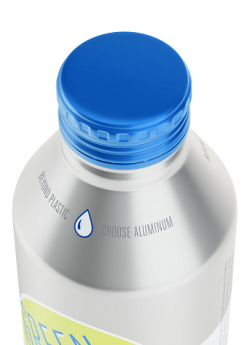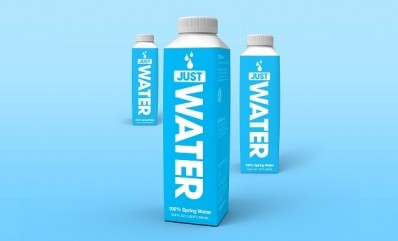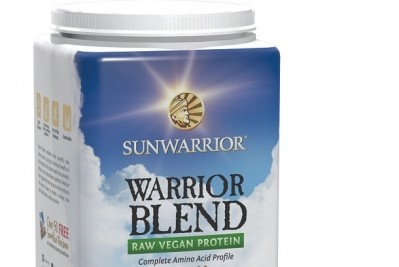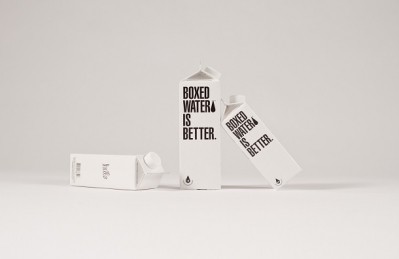Green Sheep Water sets itself apart from the herd with aluminum bottles

The fact that the 16-ounce Alumi-Tek bottles from Ball Corp. also help the Chicago-based firm’s water standout on a shelf crowded with look-alike plastic bottles is an added bonus – and an afterthought to the firm’s core mission, said co-founder Nicole Doucet.
The firm’s goal is to provide a water bottle option “that would not hinder the convenience of buying bottled water, but would have a reduced impact on the environment,” Doucet said.
She explained that she and co-founder Jess Page identified the need for a convenient but more environmentally-friendly water bottle after watching a documentary about how many plastic water bottles end up in the ocean and discovering that only a third of 1,500 plastic bottles that Americans discard every second are recycled – that is more than 38 billion water bottles added to the landfill every year.
“When we left the film, I felt like this makes no sense. People can drink from the tap and it is safe, yet people still buy bottled water because it is convenient, they don’t want to carry a reusable bottle all day or they forgot their reusable bottle at home,” Doucet said.
So the two set about trying to reduce the amount of bottles made from plastic, which “is what is causing the greatest harm,” Doucet said.
Finding the best container
Over the three years since they founded Green Sheep Water in 2009, the two considered using glass, plant-based plastics and cartons – all of which were being used as more environmentally-friendly options to traditional plastic by other firms.
But each material had significant drawbacks. Glass was too heavy to be conveniently carried in a bag all day and uses more emissions to be transported; plant-based plastics used less emissions to make, but ultimately “are still plastics” and therefore had the same problems as traditional plastic; and cartons, which are made of thin layers of cardboard, plastic and aluminum is difficult to recycle, Doucet said.
Aluminum, on the other hand, is light weight so it creates fewer emissions than glass for transport and is easier for consumers to carry, Doucet said. She added aluminum also is “infinitely recyclable,” meaning it can be recycled over and over again without losing quality or volume, whereas plastic is downcycled into lower-quality plastics that eventually cannot be reused and wind up in the landfill.
Aluminum also is recycled more than twice as often than plastic, Doucet noted. It is recycled 67% of the time compared to plastic bottles recycle rate of 31%, according to the firm’s website.
Aluminum also was an “outside of the box” material that other water marketers were not using, so Green Sheep Water knew the material would be eye-catching and help the product stand out, Doucet said.
Aluminum is not perfect
While aluminum was the best choice for Green Sheep Water, Doucet acknowledges it is not perfect.
“The main downside is it is still bottled water, and bottled water will always have a higher impact on the environment than tap. There is no magic formulation that will change that,” she said. That is why “we encourage people to drink from the tap when they have access. But for the times when they don’t, Green Sheep Water is the best way we know how to make a difference” in reducing waste without forcing consumers to change their habits.
Another downside to aluminum is it costs more than the plastic many of the firm’s competitors use – driving up the price to $1.99 per 16-ounce bottle and placing it at a slight premium.
“For us to be successful and make an impact, we need to be profitable. There is no way to reduce the cost to the point it will be competitive with mid-level or cheaper brands,” Doucet said. But, she noted, the firm is doing what it can to keep the price point – and environmental impact – down by sourcing water locally from Cold Spring, Minn., so it is less expensive and environmentally damaging to transport compared to some bottled water that is sourced half way around the world.
Banking on shoppers social conscience
Green Sheep Water also believes consumers will pay more for its product to support its mission, Doucet said. Emerging shopping trends support this idea by demonstrating that consumers increasingly engage more with socially-conscience brands despite higher prices. For example, Tom’s shoes are more expensive than similarly made footwear, but are wildly popular in part because for each pair a consumer buys, Tom’s gives a pair to someone in need.
Green Sheep Water is developing a new educational website to help consumers understand why aluminum water bottles are a socially-conscience option and to show off how it is keeping emissions lows, Doucet added.
In addition, the firm donates 5% of its proceeds to water.org to help provide clean drinking water to those who do not have access to it.
Retailer reaction to the three-week old product so far is positive, with several stores in Chicago already distributing the water, Doucet said. She added that the firm is hoping to expand distribution quickly by participating at industry events and giving away samples so consumers can experience the clean taste and convenience of water in aluminum bottles.










